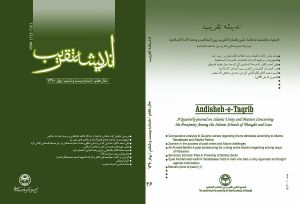فصلنامه اندیشه تقریب شماره 26
نویسنده این صفحه در حال ویرایش عمیق است.
یکی از نویسندگان مداخل ویکی وحدت مشغول ویرایش در این صفحه می باشد. این علامت در اینجا درج گردیده تا نمایانگر لزوم باقی گذاشتن صفحه در حال خود است. لطفا تا زمانی که این علامت را نویسنده کنونی بر نداشته است، از ویرایش این صفحه خودداری نمائید.
آخرین مرتبه این صفحه در تاریخ زیر تغییر یافته است: ۱۴:۳۶، ۱۵ ژوئن ۲۰۲۲؛
| نام مجله | اندیشه تقریب |
|---|---|
| صاحب امتیاز | مجمع جهانی تقریب مذاهب اسلامی |
| زیر نظر | آیتالله محمد علی تسخیری |
| مدیر مسئول | علیاصغر اوحدی |
| شورای سردبیری | سید حسین هاشمی، عزّالدین رضا نژاد، مرتضی محمدی |
| مشاوران علمی |
|
| مدیر اجرایی | محمدعلی ملاهاشم |
| شمارگان | 26 |
| سال نشر | سال هفتم، بهار، 1390 |
| زبان | فارسی |
| ISSN | 1735-7101 |
سرمقاله
مقالات اندیشهای
- بررسی تطبیقی آیات صفاتی خداوند از دیدگاه علامه طباطبایی و رشیدرضا / علیاشرف کرمی؛
- صهیونیسم در فرایند بحران های گذشته و چالش پیش رو (مقاله) / دکتر مرتضی شیرودی؛
- علی احمد باکثیر ؛ شاعری که در راستای تحقق وحدت تمام مسلمانان در حل مسئله فلسطین تلاش کرد (مقاله) / سوده نوذری
- نقش حوزه های علمیه در تقریب مذاهب اسلامی (مقاله) / عزالدین رضانژاد؛
پيشگامان تقريب
سرزمينهاى جهان اسلام
بحرین (سرزمین مروارید) (مقاله)/ ع- امیردهی
گزارشی از یک کتاب
مجتمعنا في الفکر والتراث الشهيد السيد محمدباقر الصدر (معرفی و نقد کتاب)/ سید محمد حسن حکیم
اخبار فرهنگی
مأخذ شناسی اندیشه تقریب
أ.آثار منشر شده به وسیله مجمع جهانی تقریب مذاهب اسلامی؛
- br>
ب.سایر آثای منشر شده در زمینه اندیشه تقریب [۱]؛
چکیده مقالهها
در این بخش از فصلنامه مقالات اندیشهای به زبان عربی و انگلیسی ترجمه شده است.
چکیده مقالات به زبان عربی
چکیده مقالات به زبان انگلیسی
- Comparative analysis of Quranic verses regarding divine attributes according to Allame Tabatabaee and Rashid Redha
By: Aliashraf Karami [۲]
Abstract
Quranic verses regarding divine attributes are a kind of Motashabeh verses describing divine attributes (which is a controversial topic) on the one hand and on the other hand, they are related to the Motashabeh verses which are too difficult to comprehend. This topic has created the groundworks for creation of different Islamic religions. As the nature of Islam is a religion of unity, this topic needs to be assessed. Hence, his paper compares and analyzes the viewpoints of two prominent Shiite and Sunni scholars, i.e. Alame Tabatabaee and Rashid Redha.
There are two general methods concerning such Quranic verses:
1- Mothbatein (salaf): emphasizing on proving Khabari attributes which are available in these Quranic verses about God;
2- Mo’avalin (khalaf): emphasizing on God’s lack of such attributes
After comparing Quranic verses concerning divine attributes in the two Quranic exegeses, it can be concluded that none of these authors believe in God’s physical body. Rashid Redha relies on the understanding of the majority of the followers of the Prophet and believes in Revayat’s authenticity and accepts the method of proving the acceptable (Esbat-e Maqbul) which is a type of Tafvidh. In Tafsir-e Al-Mizan- he follows Ahl-e Bayt (a.s) and considers the concept regardless of text format (method of ethbat-e Maqbul which is a Tasdiqi type). However, since these two authors have the same opinions in terms of principles and basics, we witness that they apply allegory and figurative meanings in entire verses in Al-Mizan and the majority of verses in Al-Menar.
Keywords: Tabatabaee, Rashi Redha, Al-Mizan Exegesis of Quran, Al-Menar Exegesis of Quran, Quranic verses regarding divine attributes.
- Zionism in the process of past crises and future challenges
By: Mortedha Shirodi [۳]
Abstract
Since the term ‘’Zionism’’ indicates to different heterogeneous political institutes. Finding a comprehensive definition for it is not easy. Usually, the word ‘’Zionism’’ comes with an adjective to limit the domain of its meaning; e.g. labor Zionism, Christian Zionism, cultural Zionism; however, the most famous classifications are political Zionism and religious Zionism. Religious Zionism is expressed mostly by Jewish mysticism and is related to the great desire and waiting for the master of Judaism. This Zionism developed the tradition of pilgrimage to the sacred land and even established a clerical center for dissemination of the Jewish beliefs and culture in the Zion land. The religious Zionism was never hostile with Muslims who were recognized with the children of Abraham and the followers of His religion. Religious Zionism is far from any type of political plan for establishing a state or any kind of domination of Palestine. They have never had any sign of movements against Arabs (be they Muslim or Christian).
However, the political Zionism, which was formed by Theodor Hartselle, is skeptical of God and fights event against those Jews who define Judaism as a religion. From the viewpoint of political Zionism, the Jews are a clan before anything else, thus they cannot combine with other nations and they should settle in a free land where there is no proprietor. This concept indicates that the local people (Palestinians) are not important and they should not be given any attention. This issue has brought about several crises for the Zionists. What are these crises? The present paper attempts to assess the past crises and the future challenges of Zionism.
Keywords: Zionism, Israel, United Kingdom, the U.S. Crisis and challenge.
پانویس
مطالب مندرج در مقاله برگرفته از فصلنامه اندیشه تقریب، سال اول، شماره 4، پاییز 1384 میباشد.


